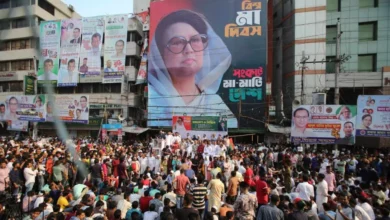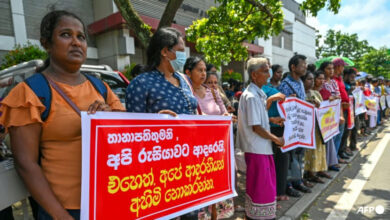Dhaka residents suffer as city records highest temperature in 58 years

Dhaka: The country’s record high temperatures have put people at risk of diseases like cardiovascular and skin conditions, as well as exposed them to heatstroke and dehydration, physicians said.
They asked people to avoid the sun as much as possible and to drink adequate water, among other measures like wearing masks, changing sweaty clothes, and caring for their mental health to avoid further problems.
They warned that heatstroke could become fatal and asked people, who were fasting in the month of Ramadan, to follow health guidelines strictly.
According to the Bangladesh Meteorological Department, a severe heat wave continued to sweep over the vast swathes of Bangladesh for the fourth consecutive day on Sunday, with Chuadanga and Jashore recording the country’s highest day temperature of 41.8C.
Chuadanga, which got baked under the hottest temperature mostly over the past two weeks, however, saw the temperature drop for the first time since April 3. On Saturday, Chuadanga saw its daytime temperature rise to 42.2C.

At noon on Sunday, Dhaka saw its daytime temperature slightly rise to 40.6C, which was the highest temperature recorded in 58 years since 1965 when the daytime temperature in Dhaka rose to 42C on April 30.
Dhaka was one of the 13 districts that recorded temperatures above 40C on Sunday.
In its 24-hour weather bulletin issued at 6:00pm, the BMD predicted the daytime temperature to remain nearly unchanged but the night-time temperature to rise.
Rain, however, was expected at the end of five days from the issuance of Sunday afternoon’s weather bulletin.
On Sunday, a severe heat wave swept the entire Khulna division, and the districts of Dhaka, Faridpur, Gopalganj, Manikganj, Narayanganj, Rajshahi, and Pabna.
The highest-ever recorded day temperature in Bangladesh in April was 44.5C in Jashore in 1964.
Bangabandhu Sheikh Mujib Medical University’s former vice-chancellor, Nazrul Islam, said that the prevailing temperature was very unusual in this geographical location and that this may cause heatstroke among people exposed to the temperature for a long time.
He added that dehydration was also another common physical problem that people might face during high temperatures.
‘People were also exposed to asthma and allergies during this time,’ he said.
He suggested avoiding dust, drinking adequate water, and not taking junk food and drinks to remain safe from health problems.
‘Take care of children, especially infants and the elderly, and ensure additional water intake for them,’ he said.

In 2022, a study conducted by researchers at Duke University in the US revealed that Bangladesh was losing 7 billion working hours annually due to extreme heat exposure caused by global warming.
A heat wave is particularly dangerous in Bangladesh because of the high humidity, which obstructs the human body’s natural cooling mechanism.
Heatstroke is the most serious heat-related illness, according to the Centres for Disease Control and Prevention, the national public health agency of the United States, and it renders the body unable to control its temperature.
In heatstroke, the body’s temperature rises rapidly, up to 41C or higher within 10 to 15 minutes, according to the CDC, while the body’s sweating mechanism fails, and the body is unable to cool down.
Heatstroke can cause permanent disability or death if the person does not receive emergency treatment.
BSMMU Internal Medicine professor Md Rafiqul Alam advised not to take cold food suddenly from the freezer before it reaches a tolerable level and to avoid the sun as much as possible.
He explained that food from the freezer might cause sneezing and fever, and viruses might attack the body.
Physicians said that urine infection, diabetic imbalance, and blood pressure might fluctuate during high temperatures.



![Mumtaz Zahra Baloch, spokesperson for Pakistan's Foreign Ministry, says the country believes in constructive dialogue with the US [Courtesy of Pakistan Ministry of Foreign Affairs]](https://southasiancorrespondent.com/wp-content/uploads/2024/06/pak-1-390x220.jpg)
